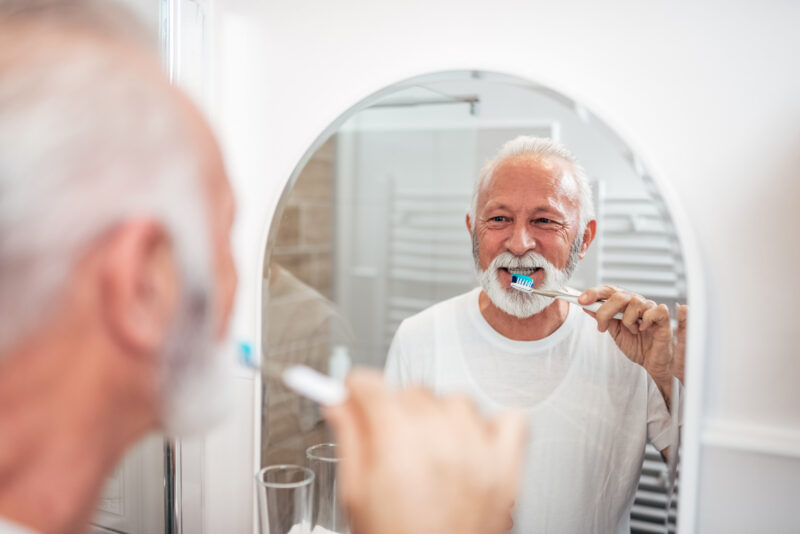In the next three decades, adults 65 and older will make up one quarter of the U.S. population. That’s 98 million smiling seniors who need to make their oral health a priority. The Center for Disease Control and Prevention reports that over 30% of seniors have untreated tooth decay and another 25% of seniors have no remaining teeth. Whether sporting their own pearly whites or carefully fitted dentures, older adults can make big strides towards better health with daily oral hygiene and professional mouth care.

Why focus on oral health?
Dental cavities and gum disease are among the most common preventable chronic health conditions in adults. More than 90% of the global population will have cavities and/or gum disease during their lifetime. As we age, dental problems accumulate and can lead to other health problems. Beyond the hassle of getting a filling, poor oral health puts older adults at increased risk of these conditions.
Heart disease
The same bacteria that causes inflamed gums and periodontal disease can get into the bloodstream. This results in hardened arteries, known as atherosclerosis, causing blood flow problems and dramatically increasing the chance of a heart attack. Damaged arteries increase the likelihood of hypertension and stroke.
Dementia
Our mouths are home to almost 700 species of bacteria, including bacteria that can cause gum disease. Studies have associated this bacteria with the development of memory loss, several types of dementia and even Alzheimer’s disease.
Pneumonia
Infected teeth and gums can cause bacteria to be breathed into the lungs, and this is in addition to bloodstream exposure. Respiratory infections such as bronchitis and pneumonia can develop into life-threatening conditions.
Diabetes
Diabetics face a double edged sword when dealing with the effects of poor dentition. Gum disease can lead to higher blood sugar levels and put individuals at a higher risk of getting diabetes. Diabetics are more susceptible to infection and slower recovery from illness, so infected teeth and gums can compound existing problems and make diabetes more difficult to control.
Rheumatoid arthritis
A feature of severe gum disease is inflammation. The bacteria that causes this inflammation may increase inflammation throughout your body. Poor dental health increases the risk of rheumatoid arthritis four fold.
Other Health Risks of long-term bad oral hygiene include kidney disease, infertility, or even certain types of cancer.

Why do seniors have oral health issues?
There are many reasons that older adults are more likely to have dental problems. Most have to do with failure to perform basic daily dental care, limited access to professional dental care, and lack of education concerning the importance of oral health. Unfortunately, oral health issues are more prominent in senior citizens that are poor, uninsured, or are members of racial or ethnic minorities. Further increasing risk of poor dentition are seniors that are disabled or live in long-term care facilities.
Medicare does not cover routine dental care, and this can be considered a luxury for seniors on a fixed income. Even seniors with dental insurance may face long drives and extended waiting periods for an appointment. Seniors who smoke are at least 50% less likely to go to the dentist or brush their teeth on a daily basis. Also, many senior citizens take medications that can cause dry mouth. Lack of saliva increases the risk of cavities and gum disease.
What can seniors do to improve oral health?
Brush your teeth and floss. Every. Single. Day. The American Dental Association advises that you brush your teeth twice a day for two minutes with a soft-bristled brush. Flossing between teeth should be performed once daily. Mouthwashes are not a substitute for brushing your teeth but the added fluoride might be beneficial. If strength or dexterity prevent a good brushing, an electric toothbrush or water flosser might help.
Make regular visits to your dentist. Other than brushing and flossing regularly, twice-annual visits to your dentist are most important. Make your appointments in advance, check to make sure your insurance is accepted, or look into community dental clinics that provide free or reduced price dental care.
Eat right. Eating processed foods and snacks high in sugar will lead to tooth decay. Carbonated soda, even diet soda, strips tooth enamel and contributes to a decline in oral health. A balanced diet including fruits and vegetables keeps bones—including teeth—in top condition.
Stop smoking and drinking alcohol. Smoking is bad for your overall health and especially for your teeth and gums. Frequent alcohol intake also affects the chemical balance of your mouth. Stopping both will have an immediate positive effect on your oral health.
Because older adults are at greater risk for dental and periodontal disease, it is important to emphasize daily brushing and flossing. Caregivers can encourage communication about oral health and watch for signs of mouth pain or disease such as bad breath or favoring one side of the mouth. Maintaining a healthy mouth will help seniors maintain a healthy body. Good oral hygiene can prevent a health crisis before it begins, and those 98 million seniors deserve a great smile.
—
Coll PP, Lindsay A, Meng J, et al. The prevention of infections in older adults: oral health. J Am Geriatr Soc. 2020 Feb;68(2):411-416.
Kishore M, Panat SR, Choudhary A, et al. Oral diagnostics: an integral component to geriatric health care. Aging Male. 2013 Dec;16(4):159-63.
Shuman S, Chen X, Friedman PK, et al. Oral Health: An essential element of healthy aging. A Publication of the Gerontological Society of America 2017:1-20.
